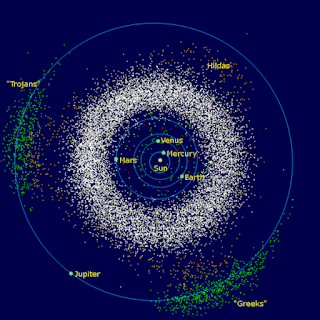The Expanse is a critically acclaimed space exploration novel series, which has been adapted into a critically acclaimed TV series. The author "James S. A. Corey" is actually a pen name used by authors Daniel Abraham and Ty Franck.
Earth and Mars, the Inner Planets (or "Inners") are locked in a cold war and require the resources of the Outer Planets to survive. Their governments and militaries compete to obtain resources from the Belters and ration their vital supplies to suppress rebellions.
The most powerful Belter faction is a worker's union known as the Outer Planets Alliance (OPA). Even this is a loose confederation of small factions spread throughout the Solar System. There have been a few incidents of Belter criminals and terrorists claiming allegiance to the OPA. Consequently, the OPA is widely considered a terrorist organisation by the Inner Planets and is often used as a political scapegoat.
Their language "Lang Belta", is a global creole. This means that vocabulary and grammar from many common languages of Earth blended together over many generations.
There is also a non-verbal sign component of the language which Belters can use on space-walks if electronic communication systems fail.
Since the majority of modern Inners speak only English, most influential Belters are fluent in English. One of the main Belter characters, Miller, enjoys Earth culture and styles himself after noir detectives. Most of the dialogue is written in English with occasional Belter expressions. The lowest classes of Belter society tend to speak with a stronger accent and use less English.
For the TV series, the Lang Belta lines are written by professional linguist Nick Farmer.
From Spanish así (so, thus, just like) + English like
bap = door
From Arabic باب (bāb)
beltalowda = the Belter people
From English belt
From English load of
From Russian люди (lyudi) (people)
From Polish ludzie (people)
From German Leute (people)
ereluf = air
From English air
From German Luft (air)
kowl = all
From Arabic كل (kull) (each, every, all)
From Hebrew כל (kol) (all, everything)
métexeng = girl
From German mädchen (maiden)
sabaka = dog
From Russian собака (sobaka) (dog)
towchu = slave
From Mandarin 驮畜 (tuó chù) (animal, beast of burden)
welwala = associate of the inner planets, traitor
From English well (referring to the gravity well of a massive planet such as Earth or Mars)
From Belter wala (one associated with [something])
From Hindi -वाला (-vālā) (one who does [something])
The Belters
The people of the outer planets and the asteroid belt are commonly called "Belters". Growing up in low gravity environments, they have developed a unique physiology, culture and language. |
| The Asteroid Belt |
Earth and Mars, the Inner Planets (or "Inners") are locked in a cold war and require the resources of the Outer Planets to survive. Their governments and militaries compete to obtain resources from the Belters and ration their vital supplies to suppress rebellions.
The most powerful Belter faction is a worker's union known as the Outer Planets Alliance (OPA). Even this is a loose confederation of small factions spread throughout the Solar System. There have been a few incidents of Belter criminals and terrorists claiming allegiance to the OPA. Consequently, the OPA is widely considered a terrorist organisation by the Inner Planets and is often used as a political scapegoat.
 |
| A logo of the OPA |
Their language "Lang Belta", is a global creole. This means that vocabulary and grammar from many common languages of Earth blended together over many generations.
There is also a non-verbal sign component of the language which Belters can use on space-walks if electronic communication systems fail.
Since the majority of modern Inners speak only English, most influential Belters are fluent in English. One of the main Belter characters, Miller, enjoys Earth culture and styles himself after noir detectives. Most of the dialogue is written in English with occasional Belter expressions. The lowest classes of Belter society tend to speak with a stronger accent and use less English.
For the TV series, the Lang Belta lines are written by professional linguist Nick Farmer.
Example vocabulary
asilik = just likeFrom Spanish así (so, thus, just like) + English like
bap = door
From Arabic باب (bāb)
beltalowda = the Belter people
From English belt
From English load of
From Russian люди (lyudi) (people)
From Polish ludzie (people)
From German Leute (people)
ereluf = air
From English air
From German Luft (air)
kowl = all
From Arabic كل (kull) (each, every, all)
From Hebrew כל (kol) (all, everything)
métexeng = girl
From German mädchen (maiden)
sabaka = dog
From Russian собака (sobaka) (dog)
towchu = slave
From Mandarin 驮畜 (tuó chù) (animal, beast of burden)
welwala = associate of the inner planets, traitor
From English well (referring to the gravity well of a massive planet such as Earth or Mars)
From Belter wala (one associated with [something])
From Hindi -वाला (-vālā) (one who does [something])
The werdhom perspective
The focus of this blog is learning multiple related languages by examining a common ancestor language. However Lang Belta provides an ambitious example of an intriguing concept: learning multiple languages by creating a common descendant language. As Nick Farmer comments: "Creoles often converge on commonalities, even if by coincidence."Special note
The theme song of the show is reminiscent of a national anthem. Lisbeth Scott, an American musician, chose to write the lyrics in Norwegian, but intentionally ignored many elements of modern grammar and syntax. Many Norwegians have lamented that the lyrics are inaccurate, but others noted that they sound "futuristic" and could reflect the evolution of the language with space travel.
Further reading
- Nick Farmer Twitter page
- Lang Belta subreddit
- Lang Belta memrise course
- Daniel Abraham (author) advises fans to follow Nick Farmer's Lang Belta
- Expanse fandom wiki - List of articles about Belter creole
Comments
Post a Comment